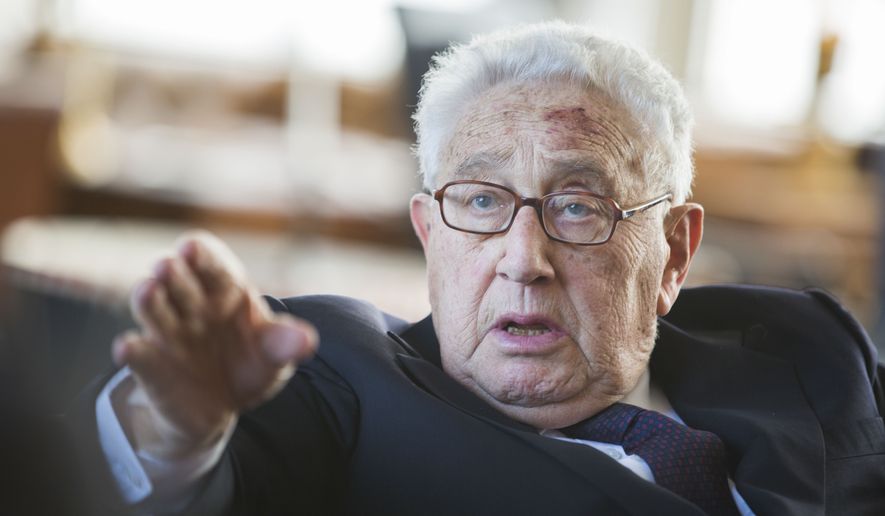As Secretary of State and national security adviser, Henry Kissinger was a heartless and erring imperialist worthy of Rudyard Kipling’s “The White Man’s Burden.”
Kipling’s famous poem fueled the 3-year Philippines-American war. More than 20,000 Filipino combatants were killed, and 200,000 civilians died from violence, famine and disease. U.S. forces burned villages, implemented civilian concentration camps and tortured suspected Filipino guerrillas.
Mr. Kissinger similarly insisted that it was America’s burden to save the world from Communism at the expense of democracy, human rights and peace.
As Peter Kornbluh has documented for National Security Archive, Mr. Kissinger championed the overthrow of the democratically elected Allende government in Chile. He feared an “insidious model effect” from democracy at work: “The example of a successful elected Marxist government in Chile would surely have an impact on — and even precedent value for — other parts of the world, especially in Italy; the imitative spread of similar phenomena elsewhere would in turn significantly affect the world balance and our own position in it.”
Thus, Mr. Kissinger enthusiastically supported Gen. Augusto Pinochet’s violent coup against Allende and the general’s human rights inferno. During Pinochet’s dictatorship, 28,000 were tortured, 2,279 were executed and 1,248 disappeared.
Chile posed no danger to the national security of the United States. Characteristic of all imperialists, Mr. Kissinger monumentally exaggerated the global ramifications of Allende’s election to justify support for his violent ouster and the defeat of democracy. What Mr. Kissinger did in Chile was morally and legally indistinguishable from Nikita Khrushchev’s suppression of the Hungarian uprising in 1956 with Soviet tanks and Leonid Brezhnev’s crushing of Prague Spring with Soviet troops.
Angola, like Chile, has never been more than an ink blot in international affairs. An impoverished former colony of Portugal, Angola was convulsed by civil war in 1976. Among the contestants for power was the Communist MPLA, backed by the Soviet Union, and the FNLA, supported by the United States. The outcome was irrelevant to anything of importance to anyone, like the future of Fiji.
Acting as a Soviet proxy, Cuba dispatched troops into Angola. Mr. Kissinger responded with imperialist hysteria. As reported by Associated Press based on declassified documents, Mr. Kissinger ordered contingency plans to smash Fidel Castro, including a military blockade, airstrikes and mining Cuban ports. Mr. Kissinger was willing to risk a wider conflict with the Soviet Union and a ground war to defend the U.S. naval base at Guantanamo Bay over a peppercorn.
Mr. Kissinger’s fevered imagination fretted that Mr. Castro’s Angola caper would make the United States appear weak. He absurdly suggested that Cuba’s intervention was threatening a wider race war that could infect Latin America and destabilize the Middle East.
In an Oval Office meeting on March 15, 1976, Mr. Kissinger maintained that, “even the Iranians are worried about the Cubans getting into the Middle East countries. I think we have to humiliate them. If they move into Namibia or Rhodesia, I would be in favor of clobbering them.” Shortly thereafter, Mr. Kissinger asserted in another White House meeting: “If there is a perception overseas that we are so weakened by our internal debate so that we can’t do anything about a country of 8 million people, then in three or four years we are going to have a real crisis.”
Mr. Kissinger was wrong.
The 1976 Clark Amendment prohibited the use of any funds of the United States to intervene in Angola. Jimmy Carter was elected president. The MPLA prevailed. Cuba was not clobbered. No race wars ensued. Within four years, the beginning of the end of the Soviet empire began with its purposeless invasion of Afghanistan.
Mr. Kissinger’s record on Chile, Angola and Cuba would have earned him a flunking grade in his own classes as a faculty member at Harvard.
For more information on Bruce Fein, visit brucefeinlaw.




Please read our comment policy before commenting.